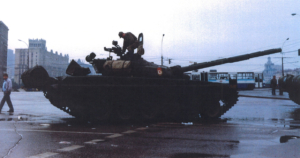
Russia marks 30th anniversary of failed coup that doomed the USSR

There were no official ceremonies or big public speeches to mark the 30th anniversary last week of the attempted coup by Communist hardliners that was defeated by Russian democrats in the dying days of the Soviet Union. An epoch-defining event that saw tanks on the streets of Moscow, the failed plot now largely evokes indifference among Russians.
- Official commemorations for the 30th anniversary were muted and President Vladimir Putin did not make an official statement. Such silence was hardly a surprise: the Kremlin tends to avoid marking events that are — in the minds of top officials — synonymous with periods of weakness for the Russian state. You only have to recall the silence that accompanied the centenary of the 1917 Russian Revolution.
- Events in 1991 began two days before the scheduled August 20 signing of a new treaty to restructure the USSR. First, the plotters visited then-Communist leader Mikhail Gorbachev while he was on vacation in Crimea. They asked Gorbachev to declare a national state of emergency and — when he refused — they blockaded him in his presidential residence.
- The following day, tanks and soldiers entered Moscow. Paratrooper units seized control of key media outlets and all television channels switched from scheduled programming to a recording of ballet Swan Lake, which was traditionally broadcast to announce a death in the country’s leadership.
- The then-president of the Russian Soviet Federative Socialist Republic (RSFSR) was Boris Yeltsin — and he led the resistance, denouncing events as an illegal takeover and calling on supporters to come to the White House (the residence of the Supreme Soviet of the RSFSR). By the evening of August 20, there were several hundred thousand people on the streets. That night, there were clashes with the military and some casualties. As public opinion swung against the plotters, high-ranking military officers announced their opposition to the coup. By the morning of August 21, troops began to withdraw from Moscow.
- Public opinion about the defeat of the coup is gradually turning negative, according to a recent survey by independent pollster Levada Center. A record 43 percent of Russians think what happened was a tragedy that had disastrous consequences. Only 10 percent now consider it a victory for democracy. There are also signs of growing indifference: 66 percent of Russians believe neither the coup plotters nor their opponents were in the right — up from 53 percent two years ago. In general, Levada Center polls show most Russians regret the fall of the Soviet Union (although less than a third want to return to Communist rule).
Why the world should care: Thirty years after the failed coup by Communist hardliners, Russia is ruled by the political heirs of the defeated plotters rather than their democratic opponents.





